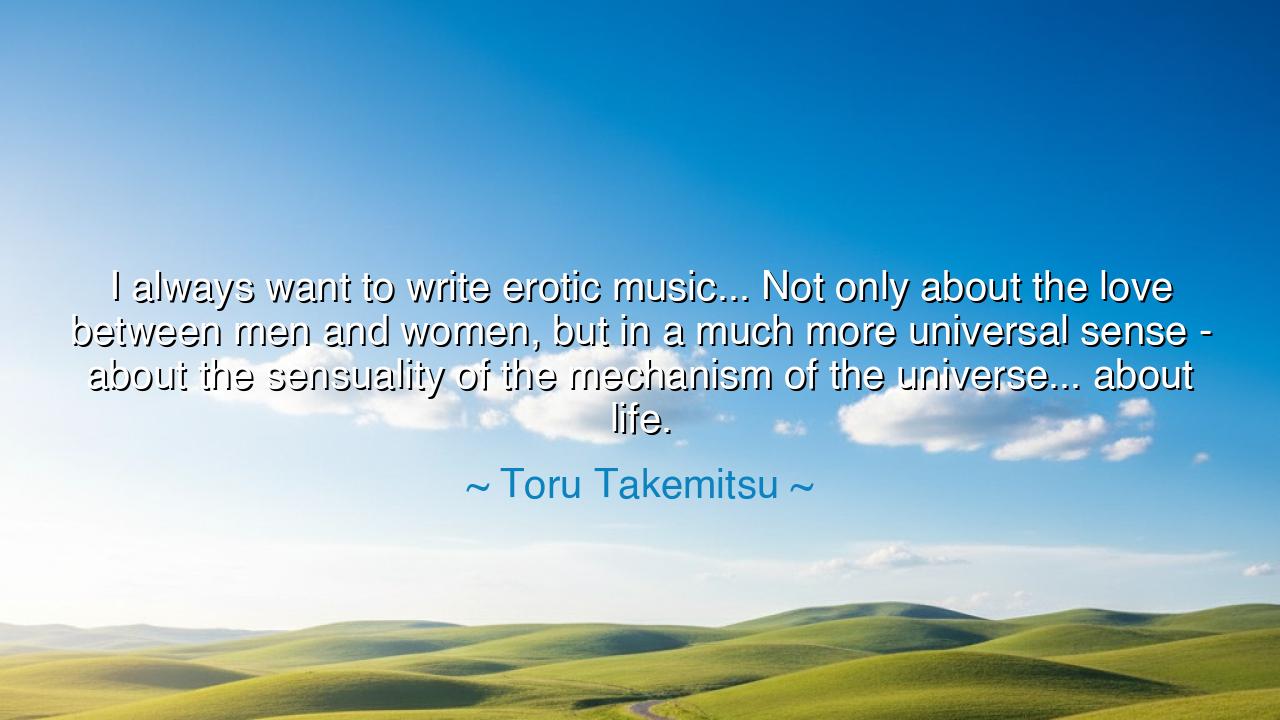
I always want to write erotic music... Not only about the love
I always want to write erotic music... Not only about the love between men and women, but in a much more universal sense - about the sensuality of the mechanism of the universe... about life.






Toru Takemitsu once said: “I always want to write erotic music... Not only about the love between men and women, but in a much more universal sense—about the sensuality of the mechanism of the universe... about life.” These words, though born from the mouth of a composer, resound like an oracle’s chant. They remind us that art, in its highest form, is not limited to the surface passions of humanity, but is an echo of the cosmos itself. For Takemitsu did not speak of eroticism as mere fleshly desire, but as the pulse of existence, the intimate dance of atoms, the great rhythm by which all creation sways.
The ancients too spoke of this mystery. They said that the universe is bound by harmony, that stars move to music inaudible to human ears, and that life itself is a song sung by the divine. To create erotic music, in this deeper sense, is to capture the tenderness of dawn touching the earth, the storm’s embrace of the sea, the secret longing of the seed to break the soil and reach toward the sun. Such music speaks not of one love alone, but of the great love that binds all things.
Consider the story of Beethoven, who, though stricken with deafness, heard within his soul the music of eternity. His Ninth Symphony does not speak of romance alone, but of the universal brotherhood of humankind. When the “Ode to Joy” bursts forth, it is the voice of the universe, celebrating the sensuality of existence itself. Beethoven, like Takemitsu, understood that true music does not stop at the borders of personal love—it expands until it becomes the heartbeat of all creation.
Takemitsu’s own life reveals this devotion. Born into a Japan divided between tradition and modernity, he absorbed influences from East and West, from nature and machine, weaving them into a soundscape that transcended boundaries. For him, even silence was music, even the rustle of wind or the trickle of water was part of the sensuality of the cosmos. He heard the mechanism of the universe as lovers hear the breath of one another, and he sought to give voice to it through his compositions. His vision was not small, not bound, but vast and universal, embracing the sacred eroticism of simply being alive.
The lesson here is profound: to live fully, we must listen as Takemitsu listened. We must hear the music hidden in the world—the laughter of children as a symphony, the falling of rain as percussion, the stillness of night as a vast, resonant chord. To see life itself as erotic, in the highest sense, is to perceive the deep intimacy between ourselves and existence, to recognize that we are not strangers to the universe, but beloved participants in its eternal song.
Therefore, let each soul approach life with reverence and sensuality. Walk as if every step is part of a dance. Listen as if every sound carries wisdom. Love not only one another, but the trees, the rivers, the stars, and the quiet spaces in between. Do not confine love to flesh alone—expand it until it becomes a way of seeing, a way of living. For then you will discover what Takemitsu meant: that music, and indeed life, is the expression of an intimate and unbreakable bond between all things.
In practice, cultivate this awareness: pause each day to listen deeply to the world, to see the small movements of life as part of a grand composition. Create something—be it music, words, or even silence—that honors the sensuality of existence. Let your love be vast, unbounded, and universal. For in doing so, you will not only live more deeply, but you will also take part in the eternal harmony of the mechanism of the universe.
Thus, Takemitsu’s words echo across time: erotic music is not merely about desire, but about intimacy with the whole of life. It is about union with the stars above and the soil beneath, with the breath of a lover and the breath of the earth itself. To live in this way is to hear the eternal song—and to add your own voice to its chorus.






AAdministratorAdministrator
Welcome, honored guests. Please leave a comment, we will respond soon